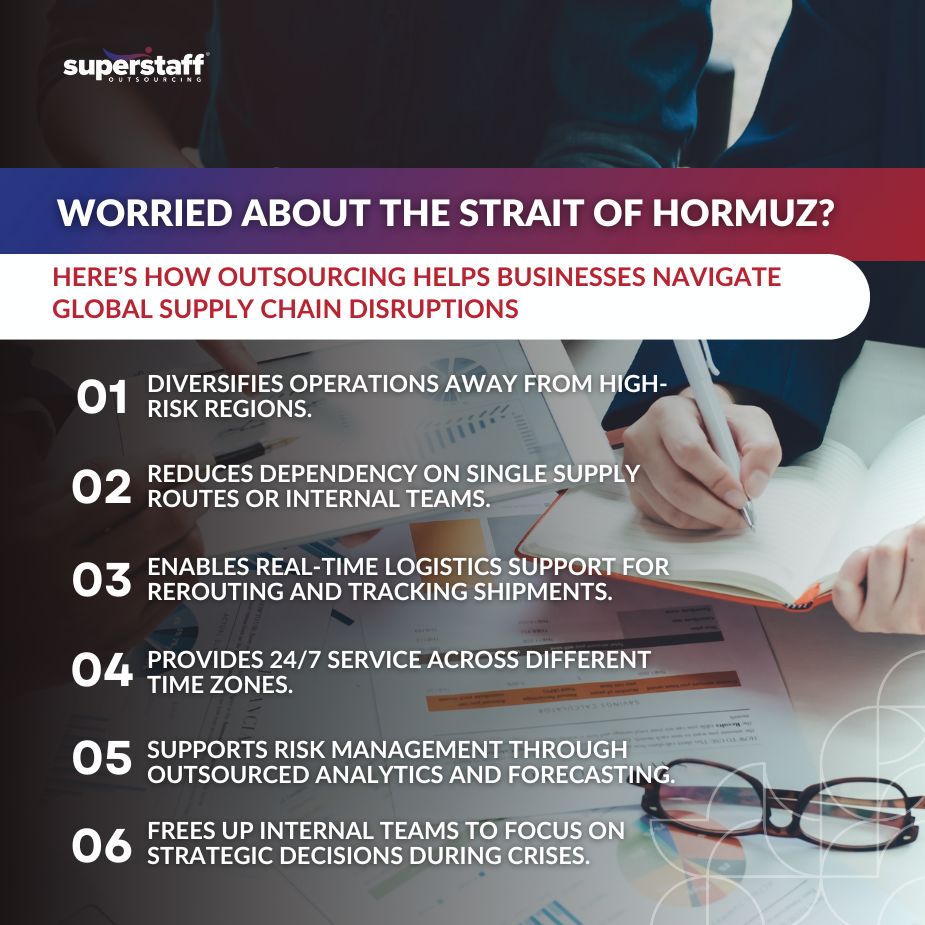
The Strait of Hormuz may seem like a distant maritime passage, but for global supply chain disruption, it represents a crucial artery of the world economy. Each day, billions of dollars’ worth of goods—most notably oil and natural gas—flow through this narrow waterway. When tensions rise in the region, so do global risks.
Recent escalations involving Iran, Western powers, and regional allies have reignited concerns over the security and accessibility of this chokepoint. With naval posturing, drone strikes, and sanctions fueling uncertainty, experts warn that even the threat of closure can send energy markets into turmoil and disrupt global trade flows. A full-scale shutdown? That could trigger a major global supply chain disruption, spiking transportation and energy costs and stalling production for companies worldwide.
A potential closure of the Strait of Hormuz wouldn’t just be a geopolitical flashpoint—it would be a seismic economic event. From manufacturing delays to skyrocketing freight prices, the consequences would be felt far beyond the Gulf region.
In this blog, we’ll explore the full scope of the risks businesses face in the event of a global supply chain disruption. More importantly, we’ll outline how diversification and strategic outsourcing—especially in logistics, back-office, and supply chain management—can help companies prepare, adapt, and maintain operational continuity no matter what happens on the global stage.
Global Supply Chain Disruption: A Potential Shutdown Could Destabilize Shipping and Logistics
While the energy narrative often takes center stage, a Strait of Hormuz closure would have far-reaching effects on global shipping and logistics. Maritime insurance companies would immediately adjust premiums upward to offset elevated risks, and shipping companies might choose to reroute vessels through longer, costlier paths such as around the Cape of Good Hope.
These adjustments would have cascading effects. Port congestion in alternate routes, delays in raw materials delivery, and increased costs of goods transported through ocean freight would all ripple through already strained supply networks. The impact of Middle East instability on supply chains becomes even more evident when these disruptions affect not just transportation but the flow of essential industrial goods.
And it’s not just oil. The Strait is also a conduit for chemicals, metals, electronics, and food products. Disruptions could delay or block the delivery of industrial inputs vital for manufacturing. Companies depending on just-in-time delivery models could face production stoppages.
Freight costs would skyrocket. Container availability, fuel costs, and port fees would all rise. These increased expenses would erode profit margins and potentially result in price hikes for end consumers.
The economic volatility isn’t limited to transport—it hits the boardroom, too.
The Broader Economic and Financial Implications of a Strait of Hormuz Closure
A closure would have significant macroeconomic consequences. Global energy markets would see immediate price spikes, contributing to inflationary pressures worldwide. Economies already grappling with inflation could find themselves pushed toward recessionary territory due to the sudden oil shipping disruption and resulting energy supply volatility.
Investor confidence would likely falter, especially in sectors that depend on steady energy pricing and logistics predictability. Global markets are already hypersensitive to geopolitical risks, and a prolonged conflict in the region could create stock market instability, affecting sectors far beyond oil and gas.
Emerging markets—many of which are net importers of oil and other essential goods—would feel the pinch even more. Increased import costs could strain foreign exchange reserves and worsen trade deficits. These countries often lack the financial cushion to absorb such shocks without long-term economic damage.
At the corporate level, a supply chain breakdown could lead to operational bottlenecks, increased inventory costs, and workforce challenges. Finance departments would face new pressures in managing currency risks, hedging commodity prices, and revising forecasts.
While this disruption is global, there are proactive steps companies can take.
Why Resilient Companies Are Turning to Outsourced Solutions to Manage Instability
In response to global uncertainties, more companies are embracing outsourcing not just as a cost-saving measure, but as a strategic pillar of resilience. By diversifying their operations geographically, businesses can reduce dependency on any single trade route or region.
Outsourcing non-core but critical functions like logistics support, financial processing, and customer service allows internal teams to stay focused on strategic tasks. This separation creates an operational buffer in times of crisis.
For example, offshoring back-office operations to stable regions such as the Philippines or Colombia can ensure business continuity even when core markets face disruptions. These countries offer skilled workforces, robust IT infrastructure, and political stability—key ingredients for reliable outsourced support.
Outsourced logistics teams can provide 24/7 visibility into shipping changes, manage last-minute reroutes, and coordinate with customs authorities across jurisdictions. More importantly, outsourcing partners can conduct ongoing supply chain impact analysis to help businesses anticipate risk, forecast disruptions, and adjust procurement or distribution strategies with agility.
Let’s explore how outsourcing serves as an operational safety valve.

How Offshore Teams Can Build Agility and Continuity for Global Companies
Offshore logistics support services bring a level of agility that can be difficult to replicate in-house during global disruptions. When routes are diverted, shipments delayed, or costs surge, businesses need real-time solutions—and that’s where outsourced teams shine.
These teams can work across time zones to manage logistics reroutes, update customs documentation, and provide accurate inventory tracking. With 24/7 operations, offshore partners can step in the moment a crisis hits, keeping supply chain communication channels open.
For supply chain-heavy industries, offshore teams can handle:
- Track and trace services
- Document verification
- Reroute coordination
- Inventory reporting
In finance and procurement, offshore teams can process payments, adjust forecasts, and communicate with vendors to maintain continuity. These services help mitigate the financial disruption that often accompanies logistics breakdowns.
Additionally, having multilingual offshore support ensures smooth communication across affected regions—an advantage that proves invaluable during crises.
Whether or not the Strait closes, future-proofing your operations is essential.
Don’t Wait for a Global Supply Chain Disruption—Outsmart It With the Right BPO Partner
A Strait of Hormuz closure is not just a Middle East issue—it’s a global business risk with implications for energy, trade, and economic stability. As this vital chokepoint remains under geopolitical scrutiny, companies must prepare for potential disruptions.
From rising oil prices and rerouted shipments to stock market jitters and manufacturing delays, the risks are vast. But they are not insurmountable. Companies that act now to build resilient operations through geographic diversification and outsourcing will be better positioned to weather whatever storms arise.
Partner with SuperStaff to explore how outsourced logistics, finance, and back-office support can help safeguard your operations from any global supply chain disruption. Business continuity isn’t just about reacting to disruption—it’s about anticipating it. Let’s plan for what’s next.






